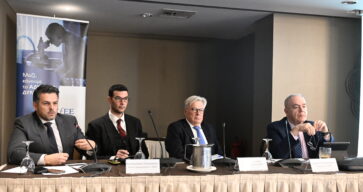SfEE statement on the June 2019 Commission Report
SFEE statement on the June 2019 Commission Report:
In its latest report, the Commission sees
what the Greek government has for years turned a blind eye to
The claw-back is increasing uncontrollably to levels soon to become unsustainable
Halandri, 7 June 2019.- The European Commission’s Third Enhanced Surveillance Report sends a vocal message about the soaring claw-back required by EOPYY from suppliers, warning that “the generation of new claw-backs is high and has been increasing over time to levels which may soon become unsustainable”.
SFEE has been sounding the alarm for several years now, as the industry faces exorbitant over taxation, with the pharmaceutical claw-back growing uncontrollably year after year. Up from EUR 79 million in 2012, the claw-back for 2018 exceeded EUR 550 million and is projected to reach EUR 680 million this year (based on IDIKA data for the January-May 2019 period), implying that over taxation will exceed 70%! Clearly, this policy is killing pharmaceutical companies and jobs, cancelling any investment plans and, above all, posing a huge risk to patients’ access to new and existing vital medicines.
At the same time, there are serious difficulties in claw-back collection, given that a number of companies are unable to pay and resort to long-term repayment arrangements, while outright defaulters do not face the consequences of the law.
Thus, on the one hand, a new generation of ailing, heavily indebted companies is created and, on the other hand, competition law is violated, as the treatment is the same across those who comply with their obligations and those who do not.
In order to address this situation, the Report recommends what SFEE has advocated for years, namely that structural measures should be implemented targeting the demand side. In particular, the Report explicitly states that “The size of the excess spending through the claw-back underlines the need for more sustained efforts to implement structural measures designed to curb supply-induced demand, and indeed some recent measures may exacerbate the situation. The need for more sustained and effective implementation applies in many areas including therapeutic protocols, negotiating committee, centralized procurement, patient registers for high cost drugs, monitoring and control of prescription patterns by doctors and dispensing by pharmacists”.
However, the most important point of the report as far as this issue is concerned is the one referring to the need for co-responsibility between the State and pharmaceutical companies, stressing that: “Unless the claw-back mechanism is reviewed to ensure that its incentive structure limits moral hazard also on the public payer’s side and improves the balance of burden sharing between the public sector and private companies, this distortion might contribute to delaying the implementation of structural measures”.
The complacency created in the government as a result of the claw-back is now documented by the Commission’s Report!
Once again, we urgently call for:
– a revision of the level of public pharmaceutical expenditure in line with the real needs of our country;
– a ceiling on clawback, and co-responsibility between the State and the industry for expenditure overruns. This would exert pressure on the system to implement the necessary reforms, but it would also increase business predictability.
It is important that the government puts in place the conditions that will ensure a sustainable Health System, centered around unhindered patient access to life-saving treatments.
The full text of the Report is available at:
https://ec.europa.eu/info/sites/info/files/economy-finance/ip103_en.pdf



